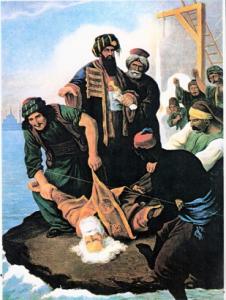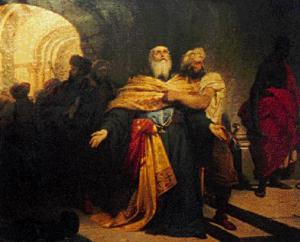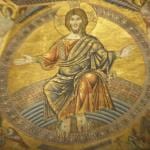It was shut by the martyred dead and only on the Last Day will the risen Martyr open the door.
In Constantinople there is a door frame where a tyrant sultan hanged a Christian patriarch by the neck until he was dead. The piety of the condemned man, his fasting and life of sacrifice, meant that his body was too light to drop and so quickly end his suffering. Instead, he was tormented for hours. So Blessed Gregory V of Constantinople was murdered by a cruel imperium for being a patriot in an evil age.
This particular Patriarch, the fifth Gregory, was heir to an ancient title unbroken for centuries. In 1453 his city and his cathedral had fallen to a foreign power and a clever ruler had made the patriarchs responsible for his people: the Christian Romans, the Greeks.
Patriarchs had the job without the power to do the job well. Centuries of patriarchs did what they could to preserve what could be saved. They persevered, often a harder job than martyrdom. Death is quick, Byzantine politics is slow torture as good men try to save better men by sly political schemes. Not all patriarchs were saints, history knew a few sinners, as the pressure to conform was immense from the Seraglio.
Gregory himself opposed hopeless revolution against tyranny. The Greeks had risen and been crushed many times. He was also a patriot in an era when the assumption, too often, was that anyone could be bought or that modernity had made patriotism obsolete. His bishops and priests rose up against the tyrants of Istanbul and he paid the immediate price. Gregory was no jingoist, no ideologue, he preferred peace to war, but he also was a Christian and so knew that peace with dishonor was worse than death.
He loved his people, loved his enemies, but would not betray his folks for the money and power of his enemies. They killed him for his virtues and not his compromises. Gregory refused to reduce Christianity to something apolitical. He wanted justice now, an icon of the perfect justice of the world to come. He knew history well enough to know that the “Christian” powers were also deeply imperfect. Many would betray their intellectual fathers and mothers in Greece. He refused to quit.
 He wanted justice now as a downpayment on the perfect justice coming.
He wanted justice now as a downpayment on the perfect justice coming.
In some lands, think of the Christians facing atheistic Communism in China, these choices are as stark as those of Gregory. Leaders work with the regime as far as they can, knowing that there is a limit to what conscience can allow. The atheists can demand more than Christian liberty can grant and so the labor camps beckon for Christian leaders. The atheists, like the Ottomans, cannot countenance conscientious objections.
The best Christian leaders stand in solidarity with the suffering. These men of the cloth work for peace, but are too humble to avoid necessary warfare. There are times in a broken world when justice demands a fight. The cost of the victory, like that of the Greeks in 1821, is born by the men and women of virtue, those who love peace, such as Gregory V.
Many bishops and priests died fighting for Greek independence: no justice, no peace.
The way is open.
It was opened by the Lord Jesus Christ, King of Kings, Lord of Lords, who harrowed Hell.
Let us go through the door of liberty.
Blessed Gregory pray for us. Pray we walk through that door.













